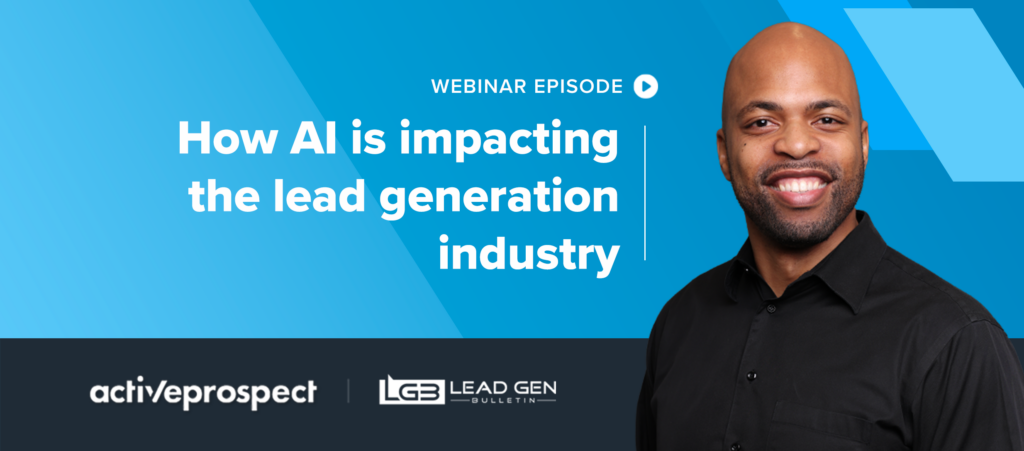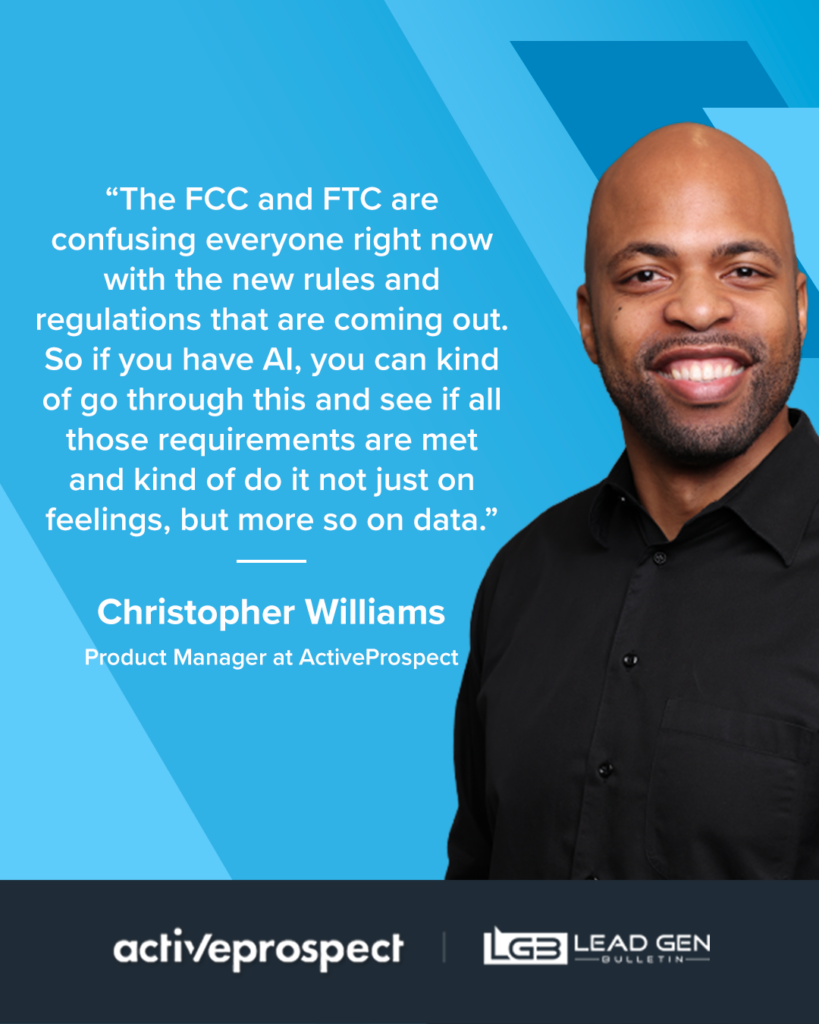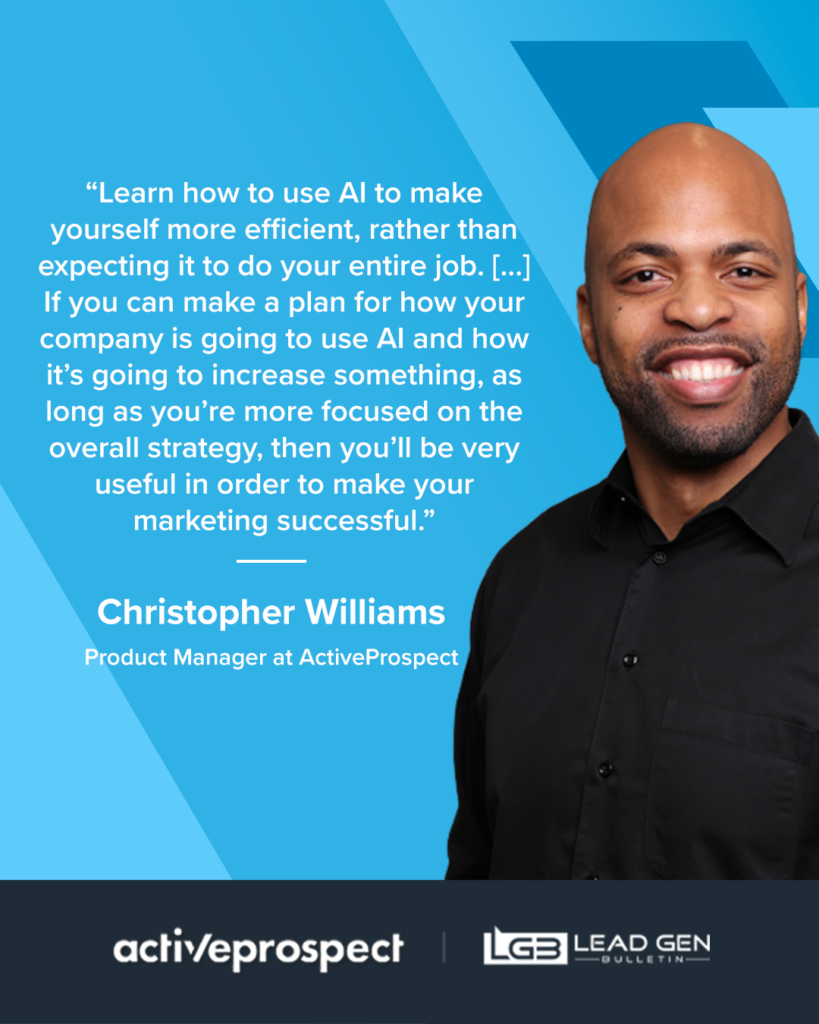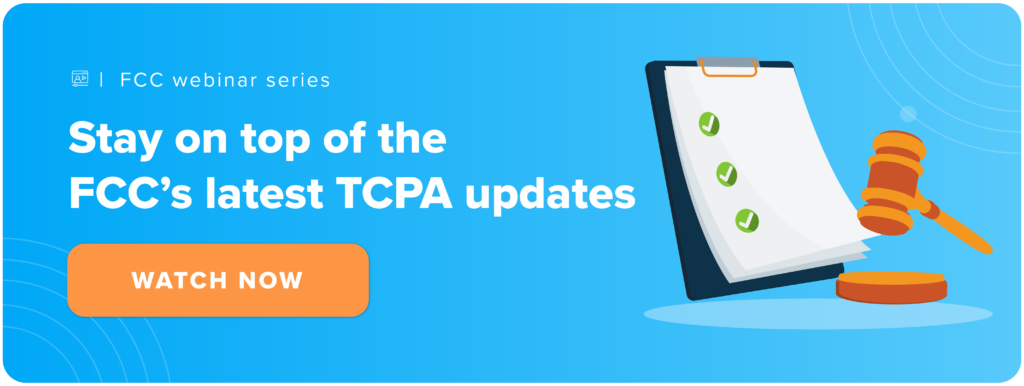How AI is impacting the lead generation industry

It’s no secret that Artificial Intelligence (AI) is transforming many aspects of our lives, including lead generation. And while it does bring efficiency and opportunities in many different ways, it also holds potential risks, which is why it’s important to discuss this matter and be aware of the ethical considerations associated with using AI in lead generation.
To this regard, our very own Technical Product Manager, Christopher Williams, was recently invited to the webinar “How Artificial Intelligence is Impacting LeadGen” hosted by Mike Gibb from Lead Gen Bulletin alongside Brent Biggs, Founder and CEO at Datascore.
The speakers discussed the ways – good and bad – AI is transforming lead generation and the future trends and best practices to keep in mind when incorporating the use of AI into lead generation practices.
Ways in which AI is transforming lead generation today
Christopher highlights several ways in which AI is revolutionizing lead generation. From using machine learning to identify high-intent leads, to providing real-time coaching for call center agents, AI is creating a myriad of possibilities for businesses. “There are just so many ways […] and I think today it’s still growing a lot,” says Christopher.

Brent continues the conversation emphasizing the potential of AI in terms of lead scoring and compliance. He suggests that AI can help businesses “cut out people who will never be your customer without having to use really expensive enrichment services.” Moreover, he points out that AI could increase compliance in sectors where agents often deviate from the script, leading to legal issues.
However, both panelists warn of the potential pitfalls of relying on AI too heavily. For example, Chritopher highlights the danger of AI inadvertently creating biases in data, which could lead to ethical concerns or legal repercussions. Brent cautions about the costs associated with AI, especially for businesses operating on tight budgets.
Potential risks associated with using AI in lead generation
The panelists both stress the importance of being mindful of the ethical implications of using AI, especially when it comes to data collection and potential biases in AI models. “AI works off of data, data collection is a hot topic when it comes to whether or not it’s morally collected and things like that. So if you don’t collect it the right way, you might find yourself in hot water and having to change some things,” warns Christopher.
Brent echoes these sentiments, highlighting the importance of truly understanding how AI models are trained and what data they use. He says, “I think the real magic is happening with Facebook, Apple, Microsoft, Google, that’s where all the heavy lifting is being done. So I think, you know, don’t believe the snake oil of people too much, you could do a lot of things yourself.”
Moreover, the panelists urge businesses to be transparent about their use of AI, especially when it comes to interacting with consumers. Brent suggests that businesses should disclose their use of AI in their form-fill disclaimers, while Christopher emphasizes the importance of giving people notice about data collection. To enhance transparency, businesses should establish KPIs to monitor the effectiveness of AI disclosure practices, ensuring consumers are fully informed about AI interactions and data collection.
AI is likely to augment rather than replace roles in lead generation
The right approach is crucial for companies adopting the AI mindset. Both Brent and Christopher agree that AI is more likely to augment rather than replace existing roles in lead generation. However, they highlight the importance of staying up-to-date with developments in AI and understanding how to incorporate it into existing processes.

Brent suggests that businesses should take advantage of available resources like YouTube and podcasts to educate themselves about AI and stay on top of market trends. He also encourages businesses to engage with companies that are already using AI to gain insights and find inspiration.
Lastly, the panelists advise businesses to be wary of companies that simply slap the “AI” label on their products without truly understanding or effectively utilizing the technology. “Dig a little bit deeper into what type of machine learning modeling they’re doing,” advises Brent.
Watch the entire episode
Webinar highlights
Introduction
“Artificial Intelligence is changing the world around us right before our very eyes. This includes how we create and manage our lead generation operations. There are tremendous opportunities to improve efficiency and output, but also a lot of risks and potential pitfalls. So today, in this webinar, we got a panel of experts here to break down how AI is impacting lead generation to make sure you have the knowledge and the tools and to make sure you aren’t falling behind.” – Mike Gibb
Positive impact of AI
“The best use of [AI] is minimizing who you’re calling by not purchasing the lead or reaching out to them if they’re not going to have the potential to be your customer.” – Brent Biggs
“[AI] is going to contribute a lot to making things more accessible, and creating more efficiencies to digital labor. So that’s exciting.” – Brent Biggs
“Certainly for performance marketers, determining which strategies actually work, which ones don’t, which ones create high intent leads, that’s where AI is going to really shine. It’s definitely going to be a huge way to improve all of your conversion rates and KPIs.” – Christopher Williams
“[AI] is going to make everything way more efficient, way more accurate, way more simple to get people to where they actually want to go.” – Brent Biggs
Potential risks of AI
“Your models will have the potential to create a bias. And you really need to be wary of that. And I think that this is one of the problems that technology just overlooks a lot of the time. So you have to be really observant, and watchful to actually even catch it. And then to solve it, you probably have to change a lot more in your data models and things like that.” – Christopher Williams
“Especially after we all heard what happened with Joe Biden in the deep fake, there are people who would just want to use AI to misrepresent what’s actually happening. They’re doing things wrong on purpose, so they’re probably not worried about the ethics of it. So be good people, don’t do things like that.” – Christopher Williams
Some best practices
“I believe [AI] is going to move faster, faster, faster, and faster, and you’ve got to get caught up now.” – Brent Biggs
“One of the first things I would do if you’re interested in learning more and keeping up to date with things is to go to Google, set a Google alert for ‘Artificial Intelligence’ and ‘performance marketing’ or something along those lines, you’ll get a lot of resources there.” – Christopher Williams
“I think it’s fascinating just to go to YouTube and google the topic, and see what’s out there and stay on top of it. So you know what’s coming.” – Brent Biggs

DISCLAIMER: This page and all related links are provided for general informational and educational purposes only and are not legal advice. ActiveProspect does not warrant or guarantee this information will provide you with legal protection or compliance. Please consult with your legal counsel for legal and compliance advice. You are responsible for using any ActiveProspect Services in a legally compliant manner pursuant to ActiveProspect’s Terms of Service. Any quotes contained herein belong to the person(s) quoted and do not necessarily represent the views and/or opinions of ActiveProspect.

